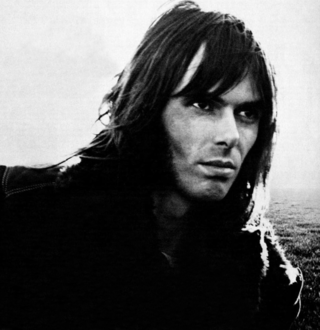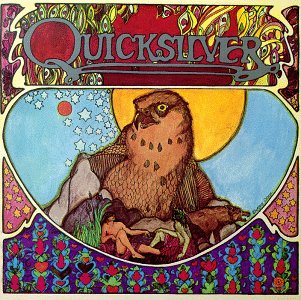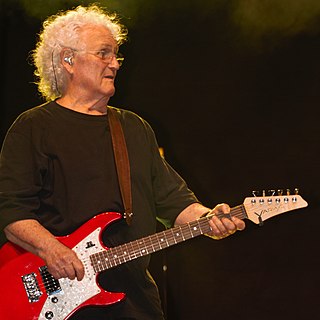
Quicksilver Messenger Service is an American psychedelic rock band formed in 1965 in San Francisco. The band achieved wide popularity in the San Francisco Bay Area and, through their recordings, with psychedelic rock enthusiasts around the globe, and several of their albums ranked in the Top 30 of the Billboard Pop charts. They were part of the new wave of album-oriented bands, achieving renown and popularity despite a lack of success with their singles. Though not as commercially successful as contemporaries Jefferson Airplane and the Grateful Dead, Quicksilver was integral to the beginnings of their genre. With their jazz and classical influences and a strong folk background, the band attempted to create an individual, innovative sound. Music historian Colin Larkin wrote: "Of all the bands that came out of the San Francisco area during the late '60s, Quicksilver typified most of the style, attitude and sound of that era."

Nicholas Christian Hopkins was an English pianist and organist. Hopkins performed on many popular and enduring British and American rock music recordings from the 1960s to the 1990s, most notably on songs recorded by the Rolling Stones, the Kinks, the Who, the Beatles, the Steve Miller Band, Jefferson Airplane, Rod Stewart, George Harrison, John Lennon, Paul McCartney, Ringo Starr, The Hollies, Cat Stevens, Carly Simon, Harry Nilsson, Joe Walsh, Peter Frampton, Jerry Garcia, Jeff Beck, Joe Cocker, Art Garfunkel, Badfinger, Graham Parker, Gary Moore and Donovan. He is widely considered to be one of the greatest studio pianists in the history of popular rock music.

Chester William Powers, Jr. was an American singer-songwriter, and under the stage names Dino Valenti or Dino Valente, one of the lead singers of the rock group Quicksilver Messenger Service. As a songwriter, he was known as Jesse Oris Farrow. He is best known for having written the quintessential 1960s love-and-peace anthem "Get Together", and for writing and singing on Quicksilver Messenger Service's two best-known songs, "Fresh Air" and "What About Me?"

John Cipollina was a guitarist best known for his role as a founder and the lead guitarist of the prominent San Francisco rock band Quicksilver Messenger Service. After leaving Quicksilver he formed the band Copperhead, was a member of the San Francisco All Stars and later played with numerous other bands.

Happy Trails is the second album of the American band Quicksilver Messenger Service. Most of the album was recorded from two performances at the Fillmore East and Fillmore West, although it is not clear which parts were recorded at which Fillmore. The record was released by Capitol Records in 1969 in stereo.

Gary Duncan was an American guitarist, singer and songwriter. He was guitarist with The Brogues, then most notably with Quicksilver Messenger Service, where the complex interplay between himself and fellow-guitarist John Cipollina did much to define the unique sound of that San Francisco based band.

Quicksilver Messenger Service is the debut studio album of Quicksilver Messenger Service, released in 1968.
Jim Murray was a guitarist and harmonica player for the psychedelic blues rock band Quicksilver Messenger Service. He also handled lead and background vocals on some songs. He left the band in late 1967 shortly before they recorded their first album.

"Who Do You Love?" is a song written by American rock and roll pioneer Bo Diddley. Recorded in 1956, it is one of his most popular and enduring works. The song represents one of Bo Diddley's strongest lyrical efforts and uses a combination of hoodoo-type imagery and boasting. It is an upbeat rocker, but the original did not use the signature Bo Diddley beat rhythm.

Just for Love is the fourth album by American psychedelic rock band Quicksilver Messenger Service. Released in August 1970, it marks the culmination of a transition from the extended, blues- and jazz-inspired improvisations of their first two albums to a more traditional rock sound. Founding member Dino Valenti, who returned to the band after a stint in prison on drug charges, was largely responsible for the new sound. Valenti's influence is readily apparent throughout; he composed eight of the album's nine tracks under the pen name Jesse Oris Farrow. Despite the marked change in the band's sound, it was their third straight album to reach the Top 30 on the Billboard charts, peaking at number 27. The only single culled from the album, "Fresh Air", became the band's biggest hit, reaching number 49.

What About Me is the fifth album by American psychedelic rock band Quicksilver Messenger Service. Released in December 1970 and recorded partly at the same sessions that produced Just for Love, the album is the last to feature pianist Nicky Hopkins and the last pre-reunion effort to feature founding members David Freiberg and John Cipollina. Several tracks, including "Baby Baby", "Subway" and "Long Haired Lady" had been played regularly at shows through 1970, previewing the album.

Quicksilver is the sixth album by American psychedelic rock band Quicksilver Messenger Service.

Solid Silver is the eighth album by American psychedelic rock band Quicksilver Messenger Service and their mid-1970s comeback album, reuniting the band's entire core lineup.

At The Kabuki Theatre is a live album by American psychedelic rock band Quicksilver Messenger Service. The last four tracks are taken from studio rehearsal tapes, probably made in 1970 and not in 1969 which is stated on the album cover.

Ace of Cups is an American rock band formed in San Francisco in 1967 during the Summer of Love era. It has been described as one of the first all-female rock bands.

David Freiberg is an American musician best known for contributing vocals, keyboards, electric bass, rhythm guitar, viola and percussion as a member of Quicksilver Messenger Service, Jefferson Airplane, and Jefferson Starship. Among other tracks, he co-wrote "Jane", a hit for Jefferson Starship.

Let It Rock: The Jerry Garcia Collection, Vol. 2 is an album by the Jerry Garcia Band. It was recorded live at the Keystone in Berkeley, California, on November 17 and 18, 1975. It was released by Rhino Records as a two-disc CD on November 10, 2009.

The Tin Man Was a Dreamer is a studio album by English musician Nicky Hopkins, released in 1973 on Columbia Records. While Hopkins had long been well known for his distinctive, melodic style on piano and Wurlitzer electric piano, the album provided a rare opportunity to hear him sing, unlike his earlier solo releases The Revolutionary Piano of Nicky Hopkins and Jamming with Edward! The album was co-produced by Neil Young's regular producer, David Briggs, and featured contributions from George Harrison, Mick Taylor, Klaus Voormann and Hopkins's fellow Rolling Stones sidemen Bobby Keys and Jim Price.
Copperhead was an American rock and roll group founded by guitarist John Cipollina, after leaving the band Quicksilver Messenger Service in 1970.
Ronald Thomas Polte was an American manager in the California Bay Area rock and roll scene. He was well known as the manager of the psychedelic music groups, The Ace of Cups quintet, one of the earliest all-female groups, the renowned Quicksilver Messenger Service, which featured a host of major talents, and briefly, the Sons of Champlin.

















